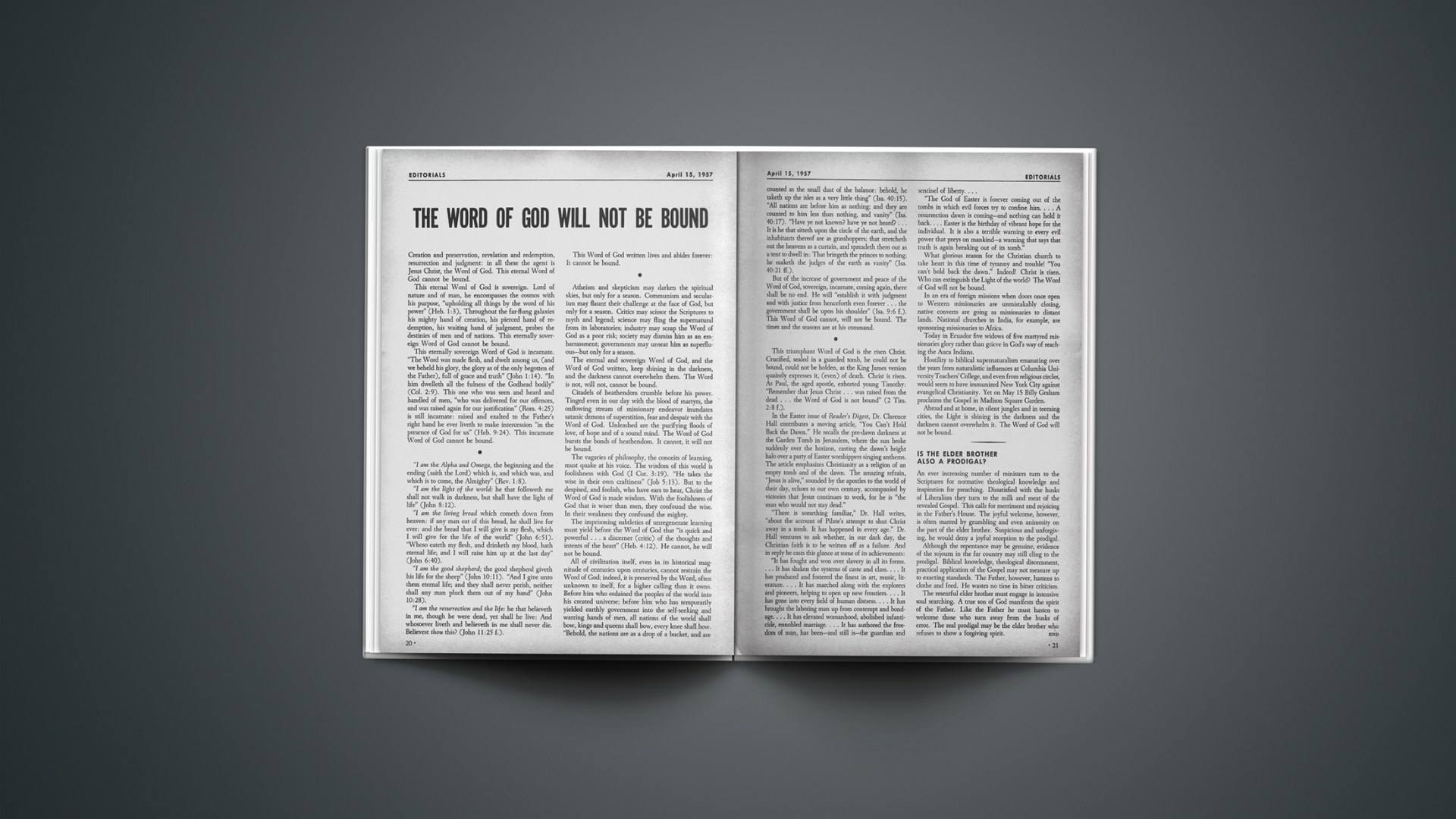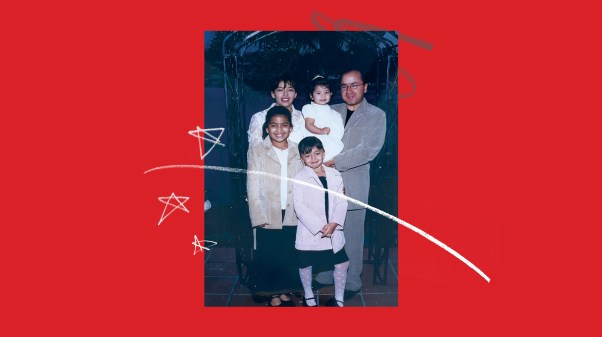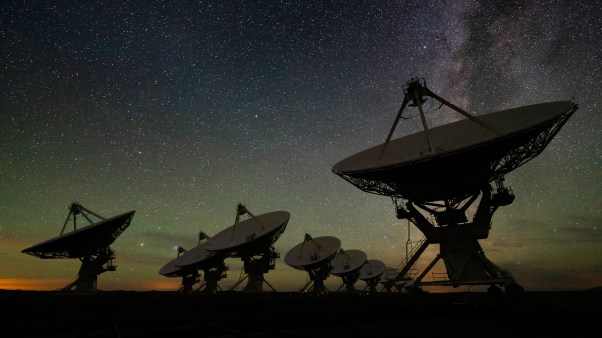The Word Of God Will Not Be Bound
Creation and preservation, revelation and redemption, resurrection and judgment: in all these the agent is Jesus Christ, the Word of God. This eternal Word of God cannot be bound.
This eternal Word of God is sovereign. Lord of nature and of man, he encompasses the cosmos with his purpose, “upholding all things by the word of his power” (Heb. 1:3), Throughout the far-flung galaxies his mighty hand of creation, his pierced hand of redemption, his waiting hand of judgment, probes the destinies of men and of nations. This eternally sovereign Word of God cannot be bound.
This eternally sovereign Word of God is incarnate. “The Word was made flesh, and dwelt among us, (and we beheld his glory, the glory as of the only begotten of the Father), full of grace and truth” (John 1:14). “In him dwelleth all the fulness of the Godhead bodily” (Col. 2:9). This one who was seen and heard and handled of men, “who was delivered for our offences, and was raised again for our justification” (Rom. 4:25) is still incarnate: raised and exalted to the Father’s right hand he ever liveth to make intercession “in the presence of God for us” (Heb. 9:24). This incarnate Word of God cannot be bound.
“I am the Alpha and Omega, the beginning and the ending (saith the Lord) which is, and which was, and which is to come, the Almighty” (Rev. 1:8).
“I am the light of the world: he that followeth me shall not walk in darkness, but shall have the light of life” (John 8:12).
“I am the living bread which cometh down from heaven: if any man eat of this bread, he shall live for ever: and the bread that I will give is my flesh, which I will give for the life of the world” (John 6:51). “Whoso eateth my flesh, and drinketh my blood, hath eternal life; and I will raise him up at the last day” (John 6:40).
“I am the good shepherd; the good shepherd giveth his life for the sheep” (John 10:11). “And I give unto them eternal life; and they shall never perish, neither shall any man pluck them out of my hand” (John 10:28).
“I am the resurrection and the life: he that believeth in me, though he were dead, yet shall he live: And whosoever liveth and believeth in me shall never die. Believest thou this? (John 11:25 f.).
This Word of God written lives and abides forever: It cannot be bound.
Atheism and skepticism may darken the spiritual skies, but only for a season. Communism and secularism may flaunt their challenge at the face of God, but only for a season. Critics may scissor the Scriptures to myth and legend; science may fling the supernatural from its laboratories; industry may scrap the Word of God as a poor risk; society may dismiss him as an embarrassment; governments may unseat him as superfluous—but only for a season.
The eternal and sovereign Word of God, and the Word of God written, keep shining in the darkness, and the darkness cannot overwhelm them. The Word is not, will not, cannot be bound.
Citadels of heathendom crumble before his power. Tinged even in our day with the blood of martyrs, the onflowing stream of missionary endeavor inundates satanic demons of superstition, fear and despair with the Word of God. Unleashed are the purifying floods of love, of hope and of a sound mind. The Word of God bursts the bonds of heathendom. It cannot, it will not be bound.
The vagaries of philosophy, the conceits of learning, must quake at his voice. The wisdom of this world is foolishness with God (1 Cor. 3:19). “He takes the wise in their own craftiness” (Job 5:13). But to the despised, and foolish, who have ears to hear, Christ the Word of God is made wisdom. With the foolishness of God that is wiser than men, they confound the wise. In their weakness they confound the mighty.
The imprisoning subtleties of unregenerate learning must yield before the Word of God that “is quick and powerful … a discerner (critic) of the thoughts and intents of the heart” (Heb. 4:12). He cannot, he will not be bound.
All of civilization itself, even in its historical magnitude of centuries upon centuries, cannot restrain the Word of God; indeed, it is preserved by the Word, often unknown to itself, for a higher calling than it owns. Before him who ordained the peoples of the world into his created universe; before him who has temporarily yielded earthly government into the self-seeking and warring hands of men, all nations of the world shall bow, kings and queens shall bow, every knee shall bow. “Behold, the nations are as a drop of a bucket, and are counted as the small dust of the balance: behold, he taketh up the isles as a very little thing” (Isa. 40:15). “All nations are before him as nothing; and they are counted to him less than nothing, and vanity” (Isa. 40:17). “Have ye not known? have ye not heard?… It is he that sitteth upon the circle of the earth, and the inhabitants thereof are as grasshoppers; that stretcheth out the heavens as a curtain, and spreadeth them out as a tent to dwell in: That bringeth the princes to nothing; he maketh the judges of the earth as vanity” (Isa. 40:21 ff.).
But of the increase of government and peace of the Word of God, sovereign, incarnate, coming again, there shall be no end. He will “establish it with judgment and with justice from henceforth even forever … the government shall be upon his shoulder” (Isa. 9:6 f.). This Word of God cannot, will not be bound. The times and the seasons are at his command.
This triumphant Word of God is the risen Christ. Crucified, sealed in a guarded tomb, he could not be bound, could not be holden, as the King James version quaintly expresses it, (even) of death. Christ is risen. As Paul, the aged apostle, exhorted young Timothy: “Remember that Jesus Christ … was raised from the dead … the Word of God is not bound” (2 Tim. 2:8 f.).
In the Easter issue of Reader’s Digest, Dr. Clarence Hall contributes a moving article, “You Can’t Hold Back the Dawn.” He recalls the pre-dawn darkness at the Garden Tomb in Jerusalem, where the sun broke suddenly over the horizon, casting the dawn’s bright halo over a party of Easter worshippers singing anthems. The article emphasizes Christianity as a religion of an empty tomb and of the dawn. The amazing refrain, “Jesus is alive,” sounded by the apostles to the world of their day, echoes to our own century, accompanied by victories that Jesus continues to work, for he is “the man who would not stay dead.”
“There is something familiar,” Dr. Hall writes, “about the account of Pilate’s attempt to shut Christ away in a tomb. It has happened in every age.” Dr. Hall ventures to ask whether, in our dark day, the Christian faith is to be written off as a failure. And in reply he casts this glance at some of its achievements:
“It has fought and won over slavery in all its forms.… It has shaken the systems of caste and class.… It has produced and fostered the finest in art, music, literature.… It has marched along with the explorers and pioneers, helping to open up new frontiers.… It has gone into every field of human distress.… It has brought the laboring man up from contempt and bondage.… It has elevated womanhood, abolished infanticide, ennobled marriage.… It has authored the freedom of man, has been—and still is—the guardian and sentinel of liberty.…
“The God of Easter is forever coming out of the tombs in which evil forces try to confine him.… A resurrection dawn is coming—and nothing can hold it back.… Easter is the birthday of vibrant hope for the individual. It is also a terrible warning to every evil power that preys on mankind—a warning that says that truth is again breaking out of its tomb.”
What glorious reason for the Christian church to take heart in this time of tyranny and trouble! “You can’t hold back the dawn.” Indeed! Christ is risen. Who can extinguish the Light of the world? The Word of God will not be bound.
In an era of foreign missions when doors once open to Western missionaries are unmistakably closing, native converts are going as missionaries to distant lands. National churches in India, for example, are sponsoring missionaries to Africa.
Today in Ecuador five widows of five martyred missionaries glory rather than grieve in God’s way of reaching the Auca Indians.
Hostility to biblical supernaturalism emanating over the years from naturalistic influences at Columbia University Teachers’ College, and even from religious circles, would seem to have immunized New York City against evangelical Christianity. Yet on May 15 Billy Graham proclaims the Gospel in Madison Square Garden.
Abroad and at home, in silent jungles and in teeming cities, the Light is shining in the darkness and the darkness cannot overwhelm it. The Word of God will not be bound.
Is The Elder Brother Also A Prodigal?
An ever increasing number of ministers turn to the Scriptures for normative theological knowledge and inspiration for preaching. Dissatisfied with the husks of Liberalism they turn to the milk and meat of the revealed Gospel. This calls for merriment and rejoicing in the Father’s House. The joyful welcome, however, is often marred by grumbling and even animosity on the part of the elder brother. Suspicious and unforgiving, he would deny a joyful reception to the prodigal.
Although the repentance may be genuine, evidence of the sojourn in the far country may still cling to the prodigal. Biblical knowledge, theological discernment, practical application of the Gospel may not measure up to exacting standards. The Father, however, hastens to clothe and feed. He wastes no time in bitter criticism.
The resentful elder brother must engage in intensive soul searching. A true son of God manifests the spirit of the Father. Like the Father he must hasten to welcome those who turn away from the husks of error. The real prodigal may be the elder brother who refuses to show a forgiving spirit.










